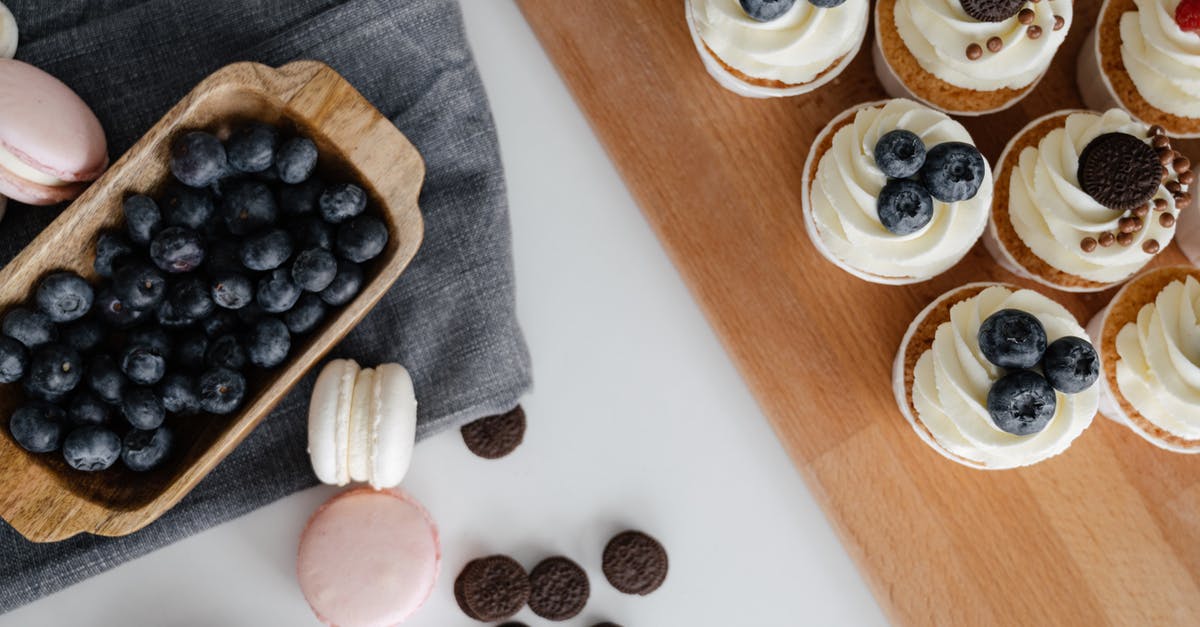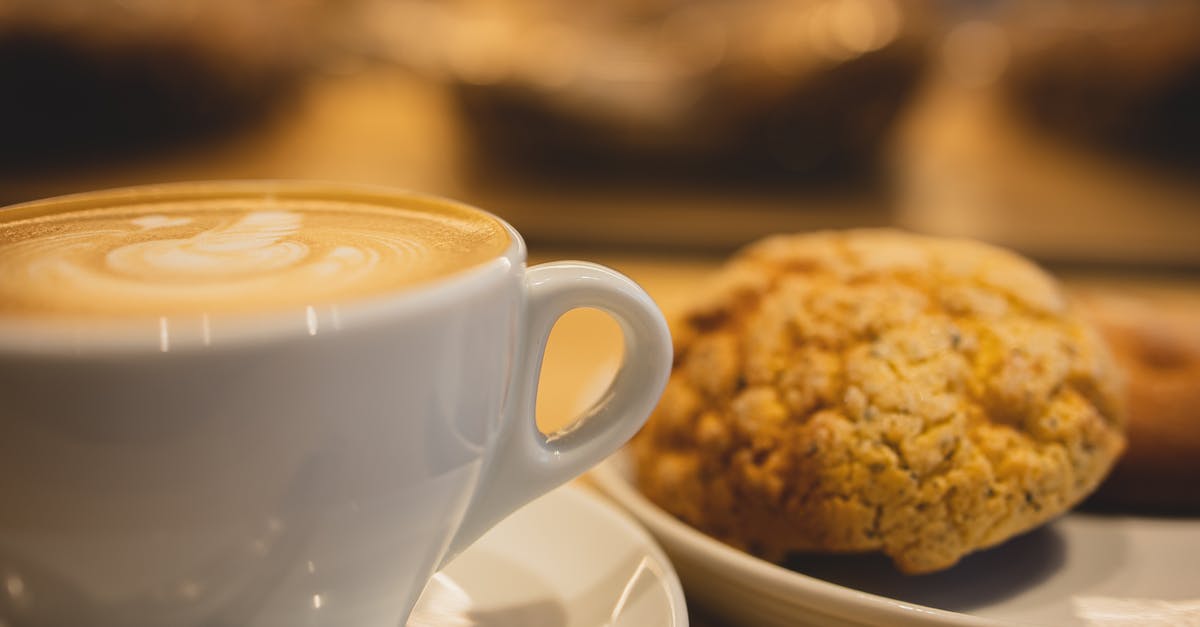Cookie Biscuits: What happened?

My wife made some chocolate chip cookies tonight using the same recipe she has for years; it's the one on the back of the Tollhouse Chocolate Chips bag. The only modification she makes to the recipe is that she uses half the butter, which ends up being only a half cup instead of a whole. Usually the cookies turn out round, flat, and about 1 cm high, but tonight we discovered a surprise. These are around an inch high and weren't completely cooked through the center as seen below.

Both of us being engineers, we are curious as to why this happened. We used the following steps and ingredients when making them:
Ingredients
- 2.25 Cups of Pillsbury all purpose flour
- 1 tsp Arm & Hammer baking soda
- 1 tsp Morten salt
- 1 stick softened Fleichmanns original butter (normally uses Land-O-Lakes) (113g pure butter)
- 3/4 cup white sugar
- 3/4 cup brown sugar
- 1 tsp vanilla
- 2 large eggs
- 2 cups Tollhouse Semi-sweet chocolate chips
Preparation steps
- Preheated the oven to 375°F (190°C)
- Whisked together flour, baking soda, and salt in a small bowl
- Beat butter, white sugar, brown sugar, and vanilla with mixer until creamy.
- Added eggs 1 at a time, beating well after each addition.
- Gradually beat in the flour mixture
- Stirred in the chocolate chips
- Dropped dough balls in place on a cookie sheet.
- Cook for 9-11 minutes
The above steps are exactly what my wife did when we made these cookies. We noticed that the dough looked incredibly dense, sticky, and was very hard to mix after it was all combined. We used a mixer instead of hand mixing the dough like she has in the past, but I find it hard to believe that this would be the culprit (someone may very well prove the cooking n00b wrong though).
FWIW, please don't critique the recipe ;), as we really only want to know why they came out as biscuits when my wife has used this recipe exactly and successfully in the past. She has followed the same routine every time she has made them except for the use of a mixer and different brands of ingredients.
Best Answer
This looks to me like the symptoms of too much flour - probably way too much.
Measuring baking ingredients by volume instead of weight is always a crapshoot, although it shouldn't be that far off - my guess is that either the flour was heavily compacted, or perhaps the baker's mind wandered off and she accidentally added an extra cup.
Overmixing (i.e. by using an electric mixer) is a common problem with cookies but the symptom of that is a hard and gritty cookie that doesn't rise - not one that rises too much and has unbaked flour in the center. As far as I know, that can only happen with a huge amount of flour. Obviously, too much flour would also result in a much denser dough.
What you ended up with seems to be more like a quickbread - almost a scone - and there is indeed not an awful lot of difference between the two aside from the ratios and the creaming of butter.
Excess flour probably wouldn't result in a stickier dough, but stickiness is more due to temperature than anything else. If you're finding the dough too sticky to mold then make sure it's thoroughly chilled - that will make it easier to work with.
Pictures about "Cookie Biscuits: What happened?"



Why did cookies deflate?
Kitchens tend to heat up during any baking extravaganza, which means the butter you leave on the counter to soften might just get too soft. If this happens, the butter will melt faster in the oven and your cookies will flatten before they've been able to set.Why did cookies spread out?
Cookies spread because the fat in the cookie dough melts in the oven. If there isn't enough flour to hold that melted fat, the cookies will over-spread. Spoon and level that flour or, better yet, weigh your flour. If your cookies are still spreading, add an extra 2 Tablespoons of flour to the cookie dough.Was the cookie made by accident?
The chocolate chip cookie was created by accident. In the 1930s, Ruth Wakefield, owner of the Toll House Inn in Whitman, Massachusetts, added broken chocolate bar pieces into her cookie batter thinking that they would melt. Instead, the classic dessert was born.Why do Brits call cookies biscuits?
New York became such an important city that the word cookie, which we got from the Dutch, became the standard word for all such baked goods. Prior to this, cookies would have been called biscuits, just like they still are today in England.Short Film: \
More answers regarding cookie Biscuits: What happened?
Answer 2
Slightly too much baking soda (heaped rather than flat tsp) or the mixture was left in a warm kitchen for longer than usual and the self-raising action kicked in.
Personally thats how my cookies always come out - it's what I aim for
Answer 3
I think it's because of the fat content of the Fleischmann's. It is not actually butter, but margarine (at least the Fleishmann's site doesn't show they make butter) and has only 9 grams of fat per tablespoon, where butter has 12 grams of fat. That means you had a bit less fat and a bit more water. 1 stick of butter/margarine has 8 Tbsp, so 72 grams of fat for the Fleishmann's and 96 grams of fat for the butter. I believe that would make a significant difference in the cookies.
Answer 4
Probably a combination of all of the above -- imperfect volume measurements resulting in too much flour & soda, -- temperature of batter, too warm = sticky = that scone top look -- electric mixer incorporated too much air in batter, -- additional consideration: weather conditions at the time of cooking
--when our house was moister than normal and our cookies came our flufflyer that normal ...and to let you know yes over mixing the batter and not forming the cookies by hand can result in overly fluffy cookies, did that last year (makes the batter too airy and the cookies form like scones looking like above)!
Sources: Stack Exchange - This article follows the attribution requirements of Stack Exchange and is licensed under CC BY-SA 3.0.
Images: Lina Kivaka, Monstera, SHVETS production, Ryutaro Tsukata
